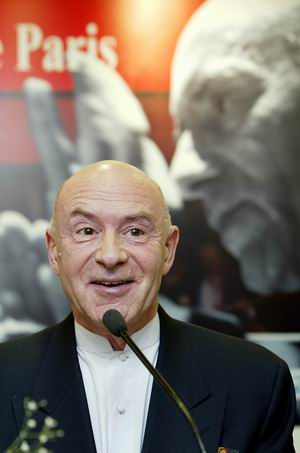
German conductor Christoph Eschenbach will present a concert
with the Paris Symphony Orchestra at the Shanghai Grand Theater tonight as part
of the Sixth Shanghai International Arts Festival.
Shanghai Daily news
Christoph Eschenbach once described himself as a person who would never stop
his exploration of music and that he would still be conducting when he is 100 --
as long as he managed to find something new in music when he is 99. So, what is
behind his appearance at the Shanghai International Arts Festival for the second
successive year and is there anything new Shanghai audiences can expect from
him?
The Orchestra of Paris's participation in the ``French Culture In
Shanghai'' program is one major reason for his presence. As its musical director
since 2000, Eschenbach and the orchestra have been devoted to exploring the
not-very-abundant yet dazzling symphonic heritage of France.
The most
remarkable collaboration between them was last year when they presented a mini
mostly-Berlioz festival at Carnegie Hall, New York to celebrate the composer's
200th birthday. Eschenbach and the orchestra proved that Hector Berlioz, as a
French romantic composer, was among the greatest of all time and his works could
fill an entire concert program and still leave the audience clamoring for more.
The Carnegie Hall concerts also proved that Eschenbach is one of the greatest
conductors of modern times.
So, their French origin is what Eschenbach and
the orchestra want to emphasize with their Shanghai concert. The program
includes Dutilleux's Violin Concerto ``L'Arbre des Songes,'' Ravel's ``Daphnis
et Chloe Suite No. 2,'' ``Valses Nobles et Sentimentale'' and ``Bolero'' the
ballet suite.
``L'Arbre des Songes'' is likely to be the concert highlight
as it was one of the composer's most important works and it has never been
performed in Shanghai. Meanwhile, to echo the Sino-French cultural exchange
program, the concert will also add the work of a Chinese composer, ``Flute
Moon'' by the US-based Shanghai native Sheng Zongliang. Reputed to be one of the
best contemporary works by Chinese composers, ``Flute Moon'' was inspired by
Chinese fairytales and ancient poems. Eschenbach's connection with China goes
back nearly 10 years when he discovered the talent of Lang Lang, now one of the
leading young pianists in the world. ``I've always been deeply interested,
indeed passionate, about helping and supporting young talent,'' says Eschenbach,
64.
``Besides the essential technical perfection and musicality that an
artist needs, the qualities I look for are: uniqueness, personality, charisma
and, on top of all of the above, a performance palette that exceeds the
boundaries of the instrument itself.
There are poets, painters and dancers
who know how to use music in that way, actors who embody the poetry and drama of
music and breathe new life into it.'' For those who still remember the
conductor's triumphant and sensational performance with the NDR orchestra last
year, they hope they will have an even more exciting night this time. Director
Li Baigu from the Music Channel of Oriental TV Station referred last year's
concert as ``a thrilling climax that winds up a enjoyable symphonic series.''
``Eschenbach was distinctively skillful in underscoring the different
qualities of different composers as well as having the orchestra, especially the
string section, keep precise pace with the original arrangements. While he did
all these with superb smoothness that you could probably tell it was what the
composer had asked for,'' Li says. After the Shanghai concert, Eschenbach and
the Orchestra of Paris will continue their ``ambassadorial tour'' with two more
concerts in Guangzhou and Hong Kong.
Date: November 2, 7:15pm
Venue: Shanghai Grand Theater, 300 People's Ave
Tickets: 150-1,000 yuan
Tel: 6386-8686, 6272-0455



